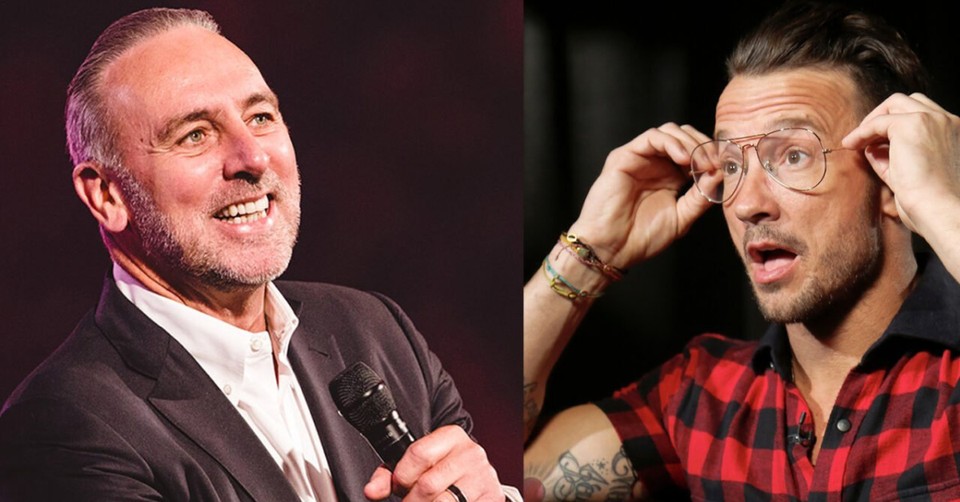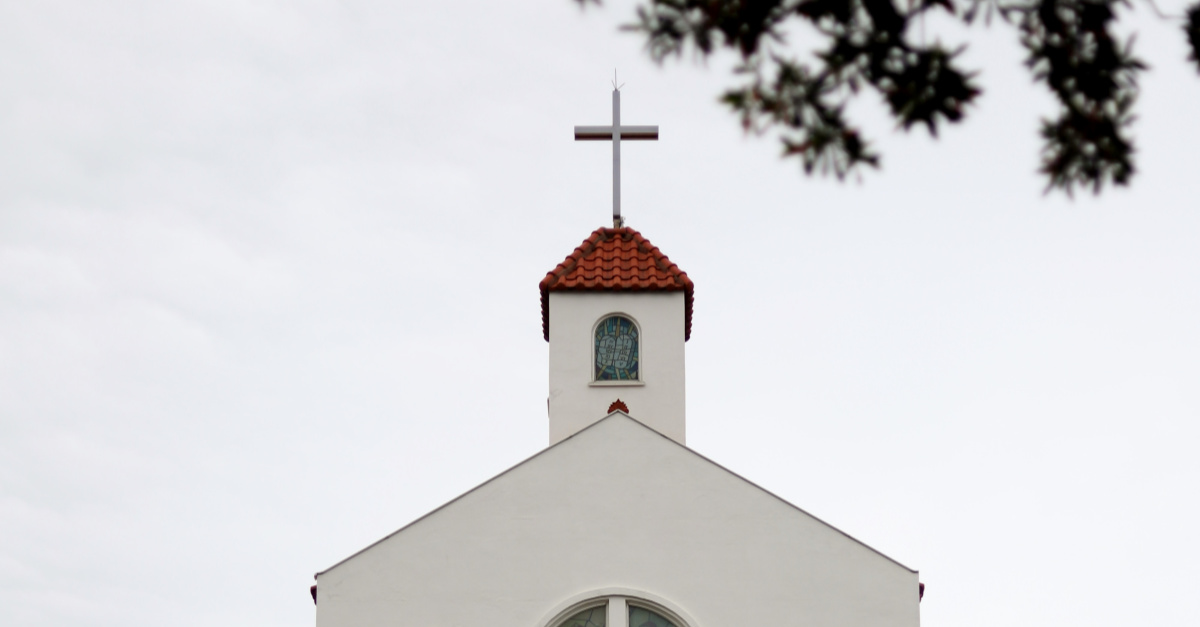10 Things All Churches Can Learn From The Secrets of Hillsong Documentary

As someone currently processing trauma from my own international church organization, I found The Secrets of Hillsong to be quite validating. Abuse of power, lack of accountability, and overfocus on the church's growth are all issues that aren't specific to my church–these problems aren't unique–it's nothing personal. Yay! But also the opposite of yay. It's a tragedy that Satan has a foothold in these areas of evangelicalism.
Because these problems aren't unique to my experiences or Hillsong, I believe it's crucial that we take the lessons from this church very seriously. There is no need to shame Hillsong or throw them under the bus. There is no perfect church. But also, we, as in Western Christianity, need to recognize the harm we perpetuate by allowing toxic church cultures to continue.
(You may be like me and not have known before this series that Hillsong worship music is actually the band for their eponymous megachurch. The charisma, flashing lights, and heartfelt emotional swells that we associate with Hillsong worship songs are all evidently emblematic of Hillsong church services.)
The Secrets of Hillsong is a four-part series chronicling the Australian-turned-international megachurch's history, influence, and misconduct. The story primarily revolves around celebrity pastor Carl Lentz, his ex-senior pastor Brian Houston, and Brian Houston's father, Frank Houston. It covers everything from the megachurch's toxic culture, racism, child sexual abuse, influencer culture, women's roles, financial misconduct, cover-ups, and more.
As a note, this documentary was made in 2023 but referenced events that happened decades earlier (along with current ongoing court cases). It's completely possible that the church has made positive changes since then. But the fact remains that we can learn from the negative experiences of congregants and avoid their pitfalls as we all learn and grow to be more like the Church Jesus wants us to be.
Here are ten lessons from The Secrets of Hillsong that every church should embrace:
1. Worship Jesus, Not People
The docuseries emphasizes how fervently Hillsong congregants revered Carl Lentz. He was Hillsong, New York City's founder and headliner. He wore an expensive leather jacket on stage and had a trendy haircut. He was a spiritual mentor to famous athletes and celebrities like Justin Bieber.
Lentz had a charisma and preaching style that drew crowds of thousands. Carl was the main draw to come to church rather than Jesus.
No matter how powerful someone is as a preacher, they should never be the main character of a church. Because when idols topple, people's faith topples with it.
2. Hold Leadership Accountable
For the sake of space and consideration, I won't share too much detail, but several Hillsong leaders were accused of sexual misconduct in various ways. Instead of being dealt with in the light, these accusations would be swept under the rug.
Rather than pastors getting fired or prosecuted, Hillsong would move them or change their position. There didn't seem to be any true justice for the victims.
The docuseries talks about this as if it were a widespread cultural issue. Issues with leaders were kept hush-hush, and Hillsong's priority was keeping the leaders out of trouble rather than making things right. Certain staff members of Hillsong are required to sign an NDA, which makes it very difficult to speak out against these real issues.
God takes harm done by leaders very seriously, and so should we.
3. Be Transparent about Church Finances

The docuseries also hit on how it was very opaque to congregants how their tithe was being used. Hillsong would take in $150 million worldwide per year. Their leaders would go on lavish retreats and have expense accounts of up to a million dollars. Their church had tiers of membership, where if a congregant gave a certain amount of money, they would get to have coffee with the celebrity pastor, almost like it was a pyramid scheme.
It's not wrong for churches to grow. But when this much growth leads to this much money, without transparency, you have to wonder what the motives are behind gaining members: is this about the gospel or money?
Churches should be very straightforward with their congregants about where their money is going. It's not wrong for a pastor to live a comfortable life, but there are limits, and the congregation should decide where those limits lie.
4. Value Volunteers Instead of Exploiting Them
Closely related to financial transparency is paying people for their time. Due to 1) the amount of sheer labor needed to put on extravagant shows at every Sunday service and 2) the toxic hierarchy related to being "chosen" to serve Hillsong, there was a culture of exploitation of volunteers.
Former congregants shared how they couldn't keep jobs because of how many hours a week they put into setting up and taking down the stage, lights, music equipment, etc. But because of the twisted culture and blind loyalty they had to serve the church, they felt lucky to be able to and didn't question that they weren't being paid. This isn't right.
At least in the experiences of the people in the docuseries, the Hillsong worship team didn't receive hardly any money from the hits they were producing. Despite the wild success, one band member was in credit card debt because of what he was devoting to Hillsong worship.
Of course, not every church will have grammy-award winning members of their worship band, but the principle remains that God loves a cheerful giver, not an exploited one.
5. Focus on Loving People, Not Gaining Numbers

In the 2010s, Hillsong, New York City, was growing like crazy. And while Jesus wants the Gospel preached to every human, there comes a point where people cease to become people when they become just a number.
A spiritual psychoanalyst on the show aptly said, "You need systems in place to meet the needs of the people who are in your community. And I think where it gets tricky is when the expansion is going faster than the ability to still show compassion, to still meet needs."
This is so key.
Even further, Leaving Hillsong Podcaster Tanya Levin said, "Hillsong can't become a healthy organization. It's a system of abuse, and without that system, it's not Hillsong. It's just a regular church. It can't have [the] levels of success and reach that it has if it's going to treat people properly. Keep children safe. Pay staff appropriately. Have equality."
Success doesn't mean anything to God if it's at the cost of harming people. Church growth is important–but not more important than love (Mark 12:30-31).
6. Representation Matters
Although Lentz was known to be very progressive as a pastor, critics shared that he was still behind in the times. He was comfortable saying "Black lives matter," and would say it publicly. But on stage and on the leadership team, people of color were nowhere to be seen.
Former congregants that were people of color shared how hard this was for them. Although Lentz said he wanted to be "organic" and not disallow white people from being on the worship team just to make room for people of color, a group of people gave their perspective that he needed to be intentional.
When someone of color walks into a church for the first time and only sees white singers, white speakers, and white people in leadership positions, it instantly makes them feel like they don't belong, which is the opposite of Jesus' goal. And the solution really is so simple: care for the disenfranchised by giving them a voice in your congregation.
7. Welcome LGBTQ Members, or Be Transparent if You Don't
A former congregant who is openly homosexual had a very negative experience where everyone in his church community knew about his relationship with his boyfriend and seemed accepting of it. And not only that, the message he got from the pulpit was that it was accepted too. Hillsong's taglines like "Everyone belongs" gave him that impression of acceptance, only to find out the exact opposite in a very public way.
He shared, "Hillsong New York City never spoke against homosexuality; they never spoke against the gay community. Well, of course, your congregation is filled with homosexuals. Like, of course, we're there. What we're hearing sounds to us like you're on our side. That you're with us. You're telling us we belong. Aren't you? Aren't you?"
I believe many American churches can fall into this trap of being ambiguous because they don't want to scare anyone in the LGBTQ community off. But that ends up hurting people in the long run.
This section is tricky to write because this conversation has so much nuance. However, regardless of if you personally believe homosexuality is a sin, the fact remains that many homosexuals don't believe it's a sin and also want to worship God. If their lifestyle is welcome in your church, make that known. But if it's not, make that known too, sooner rather than later.
8. Give Women Opportunities to Serve Regardless of Marital Status
At Hillsong churches in the docuseries, women preached only to women. And if women did speak to the whole church, it was only with their husbands.
Single women shared that it felt like their talents and gifts weren't wanted because they were defined by being single women and therefore overlooked.
Even if your church holds to the conviction that women should not preach to men, there are so many amazing ways that women can serve. As another underprivileged part of the church, it is important to be intentional about how they can be lifted up and utilized, regardless of whether they have a ring on their finger.
9. Deal with People's Root Issues
In a couple of interviews, Lentz opens up about being sexually abused as a child. He is careful not to eschew responsibility for his affair but does attribute the origination of his struggles with sex, truth, defense systems, and control to this devastating experience as a child.
And he makes a valid point about how Christian culture misses the mark when it comes to healing people as a whole instead of just labeling every struggle as a sin. He says, "Unfortunately, sometimes in our Christian community, we have just neglected, you know, logic. Neglected science. Neglected therapy. Neglected help."
He goes on to share his rehab experience, where counselors would say, "Now you have some issues that you need to work through. Let's save the 'lust' stuff for your Christian summer camp, and let's talk about your brain chemistry."
It's not that lust, deceit, etc., aren't sins because they are. But we can really benefit from treating people as whole people–not just sin-output machines.

10. The Church Universal Needs a Paradigm Shift
Faith and culture writer Katelyn Beaty said, "For any evangelical community, there needs to be a recentering of the heart of the faith over and against strategy and metrics and 'success' and the numbers game."
Former Hillsong congregant Ashley Jones said, "This whole contemporary Christian culture, it needs to be dismantled in some way and reborn as something else."
Again, no church is perfect, and we'll always get some things wrong this side of heaven. But when this many people have been publicly hurt by a church system–by its focus on money, power, and reputation–you have to wonder how many more people are hurting that haven't had a platform like a TV show to speak up about it.
Writer Mike Cosper begins to wrap up the show with this suggestion, which I believe to be a helpful framework for all churches moving forward:
"What if you took a year and, instead of counting attendance on Sundays, instead of counting conversions, measured success based on how the church is showing up in times of real crisis? Crisis of life, crisis of loss, crisis of suffering. I think if the church wants to look at "how do we avoid the pain of this stuff in the future," really look to why people thought the church mattered."
The church matters because it's a meeting place for the earthly and divine to interact. The church matters because it's true community. The church matters because it is Jesus' hands and feet working in the world today. The church matters because it's how God reaches the world.
Let's take these serious lessons to heart and be Jesus' hands and feet working for good, not for harm.
The views expressed in this commentary do not necessarily reflect those of CrosswalkHeadlines.
Kelly-Jayne McGlynn is a former editor at Crosswalk.com. She sees the act of expression, whether through writing or art, as a way to co-create with God and experience him deeper. Check out her handmade earrings on Instagram and her website for more of her thoughts on connecting with God through creative endeavors.
Originally published July 18, 2023.







